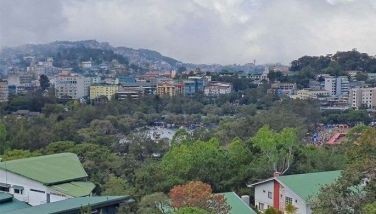'Deputy Ombudsman asked for P250,000'
MANILA, Philippines - The IIRC, however, apparently sees the matter differently. Insists an IIRC insider: “The way the committee sees it, (Mendoza) was serious about what he was saying.”
It may be for this reason that the committee issued its most scathing comments against the Office of the Ombudsman. While it could not recommend any charges of extortion against officials at the Ombudsman’s office, the committee charged the office with “inexcusable negligence” in delaying Mendoza’s case, and questioned the “undue interest in the case” of Mendoza.
“Ombudsman Gutierrez and Deputy Ombudsman Gonzalez committed serious and inexcusable negligence and gross violation of their own rules of procedure in failing to promptly resolve without justification, and despite repeated written pleas, Mendoza’s motion for reconsideration to the judgment of dismissal, which prolonged inaction precipitated the desperate resort to hostage-taking” the committee report stated.
Anatomy of a charge
The dismissal of Mendoza and four other policemen belonging to the Manila Police Mobile Unit stemmed from a charge of extortion filed by student-chef Christian Kalaw in 2008. Kalaw alleged that he was manhandled and threatened by Mendoza’s men after they accosted him near La Salle University in Manila.
Kalaw said that he was brought to Mendoza’s office at the Manila Police Mobile headquarters, where Mendoza allegedly demanded P200,000 in exchange for Kalaw’s freedom. In his affidavit-complaint, Kalaw said they ended up settling for P20,000.
But the complaint against the policemen failed to prosper before the City Prosecutor’s office, largely because Kalaw never appeared to pursue his complaint. The same case was elevated to the PNP’s Internal Affairs Service, where it was also dismissed for failure of Kalaw to appear.
Then in July 2008, Deputy Ombudsman Gonzalez directed the PNP to turn the case over to his office, an act that drew this observation from the IIRC: “It appears that the Ombudsman exercised jurisdiction over the case based on a letter issued motu propio by Deputy Ombudsman Emilio Gonzalez III, directing the PNP-NCR – without citing any reason – to endorse the case against Mendoza and the arresting policemen to his office for administrative adjudication, thereby showing undue interest on the case.”
Seven months later, Gonzalez ruled for the dismissal of Mendoza and the four other policemen. The ruling was approved by Acting Ombudsman Orlando Casimiro in May 2009.
The committee pointed out that the ruling was based “on the sole and uncorroborated complaint-affidavit of Christian Kalaw, which was not previously sustained by the City Prosecutor’s Office and the PNP Internal Affairs Service.” In other words, the one and only piece of evidence considered by Gonzalez’s office was the first affidavit executed by Kalaw when he filed his complaint before the City Prosecutor’s Office.
Five-day period
Still, Mendoza had recourse; under the rules of the Ombudsman, he could file a motion for reconsideration that had to be resolved within five days of filing. Mendoza filed his motion in November 2009. The motion for reconsideration remained unresolved for nine months, until Mendoza finally took his hostages.
“By allowing Mendoza’s motion for reconsideration to languish for nine long months without any justification, Ombudsman Gutierrez and Deputy Ombudsman Gonzalez committed complete and wanton violation of the Ombudsman prescribed rule to resolve motions for reconsideration in administrative disciplinary cases within five days from submission,” the IIRC report notes.
“The inaction is gross, there being no opposition to the motion for reconsideration.”
Adding yet another complex layer to the mix, the Ombudsman ordered Mendoza’s dismissal to be enforced immediately. In a 2008 ruling (Samaniego vs Ombudsman), the Supreme Court ruled that judgments of the Ombudsman in disciplinary cases become executory only after denial of an appeal.
“This implies,” says the IIRC report, “that an Ombudsman judgment of dismissal cannot be executed if subject of a pending appeal.”
“If an Ombudsman judgment of dismissal cannot be executed when subject to a pending appeal before the higher courts, what more for a judgment of dismissal that is still subject of pending reconsideration before the Ombudsman,” the committee says.
Soft heart
For his part, Assistant Ombudsman De Jesus defends the slow resolution of Mendoza’s case by saying the Ombudsman receives thousands of complaints a month. In addition, De Jesus says the five-day period to resolve motions for reconsideration is not mandatory.
[Since the office has a soft heart for dismissed employees, so the practice is to have it studied very well, studiously and laboriously,” he says. “The length of time in this case occurred because of the laborious and thoughtful study put into the case all over again.”
“There is no violation of the law (with regard to the five-day period to resolve motions for reconsideration),” asserts De Jesus. “Because we’re talking about livelihood, the life of the respondents, and their families, that’s why this was being studied very carefully. We have to reckon the fact that this is not the only case in our office. We have only a few lawyers.”
Own MR
De Jesus says the Ombudsman is also aware of the Samaniego doctrine, which states that penalties greater than one-month suspension are not executory so long as there is a pending appeal. But he says that the Ombudsman is contesting the Supreme Court ruling with its own motion for reconsideration. Until that motion is resolved, he argues, the Ombudsman believes all its rulings are immediately executory.
The IIRC, however, thinks otherwise.
“Had the Ombudsman officials performed their duty under the law and acted decisively, the entire crisis may have ended differently,” its report says.
This may be partly why, in the last page of its 82-page report, the committee paints Mendoza as a villain, but one who was among many other villains, a criminal who was a victim as well, “a man with a perceived injustice and oppression done against him, so common in Philippine society, cornered and forced to a murderous and insane mission.”
(To be continued)
- Latest
- Trending































